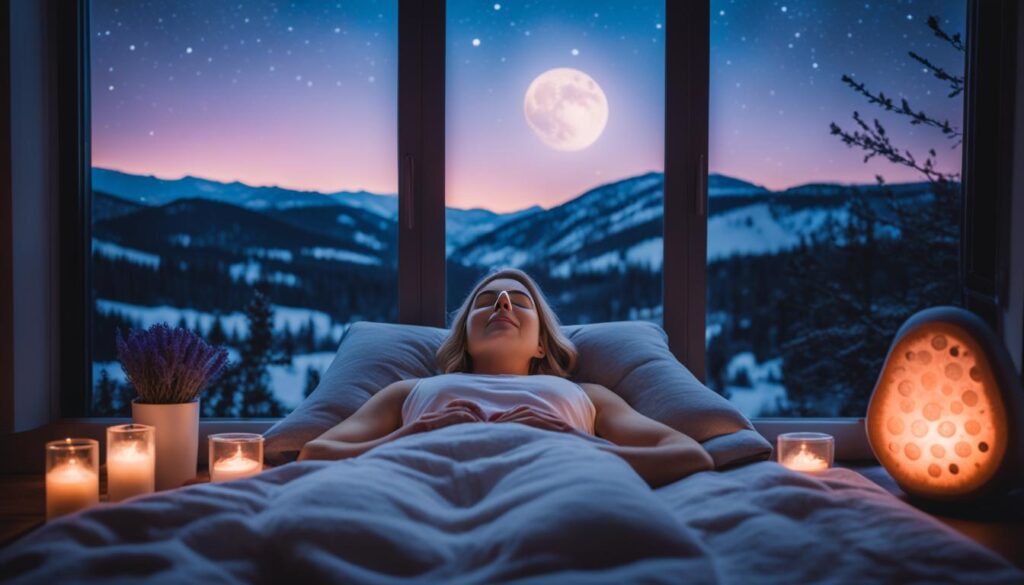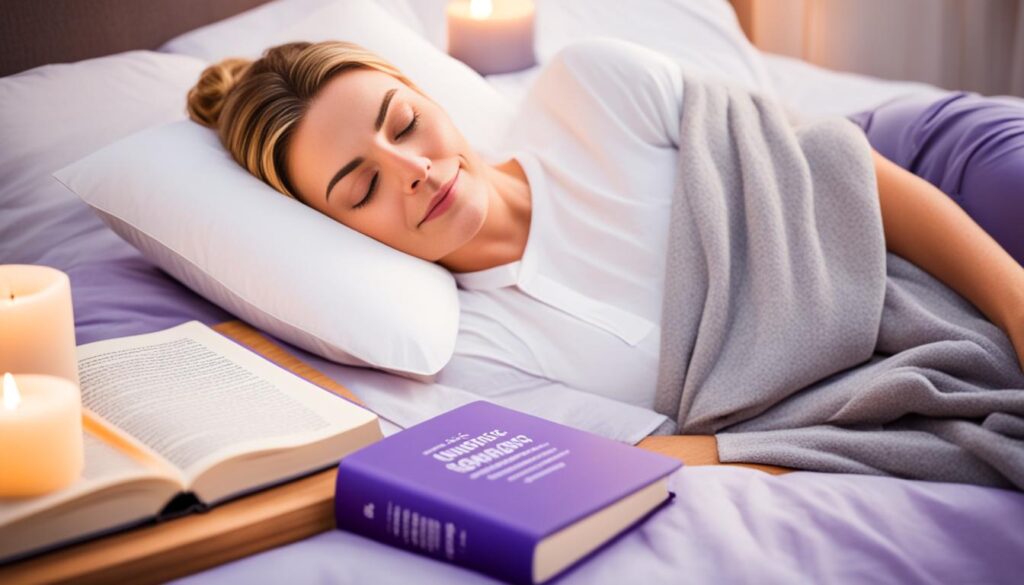Do you feel frustrated because you can’t get a good night’s sleep? The solution is closer than you think. Here, we share 7 tips that are proven to enhance your sleep. They will help you start your day feeling fresh and ready.
Key Takeaways
- Establish a consistent sleep routine to regulate your body’s circadian rhythm
- Create a sleep-friendly environment by optimizing your bedroom for optimal rest
- Manage stress and anxiety through relaxation techniques to promote better sleep
- Limit screen time before bed to avoid disrupting your natural sleep-wake cycle
- Incorporate regular exercise into your routine, but avoid intense workouts close to bedtime
The Importance of Quality Sleep
Quality sleep is essential for a good life. It affects our health and mood greatly. When we sleep well, we’re in better shape overall.
Understanding the Benefits of Restful Nights
Getting good sleep helps our body and mind. It makes us think better and feel happier. Plus, it helps keep us healthy by boosting our immune system.
When we sleep deeply, our brain strengthens memories. It also helps us make good choices and control our feelings.
The Consequences of Sleep Deprivation
Not sleeping enough is bad for us. It can make us lose focus and raise the risk of getting sick over time. Plus, it may lead to mental health issues.
If our sleep isn’t good, our body’s time clock gets messed up. This leads to problems that can make us gain weight or get sick. These problems include being overweight, having diabetes, or heart issues.
Sleep is the golden chain that ties health and our bodies together. – Thomas Dekker
Realizing how important good sleep is can change our lives. Learning about the good and bad of sleep can help us make better choices. This way, we can make sure we get the most out of our sleep and feel great.

7 tips for better sleep
Sleep is vital for our health and well-being. To get better sleep, follow these 7 tips. They will help you create healthy sleep habits and enjoy more peaceful nights.
- Establish a Consistent Bedtime Routine: Create a pre-sleep routine. You could read a book, take a warm bath, or stretch lightly. It tells your body it’s time to relax and get ready for sleep.
- Create a Sleep-Friendly Environment: Your bedroom should be dark, cool, and quiet. Add blackout curtains, a white noise machine, and update your mattress and pillows for extra comfort.
- Manage Stress and Anxiety: Try relaxation techniques like meditation, deep breathing, or writing in a journal before bedtime. These will quiet your mind and body.
- Limit Screen Time Before Bed: The blue light from screens can harm your sleep schedule. Turn off phones, tablets, and computers at least 30 minutes before sleeping.
- Exercise Regularly, but Not Too Late: Exercising helps with sleep quality. But, don’t do intense workouts right before bed, as they might keep you awake.
- Avoid Stimulants and Heavy Meals: Say no to caffeine, nicotine, and big meals in the evening. These can stop you from falling asleep.
- Consider Natural Sleep Remedies: Products like herbal teas, essential oils, and melatonin might relax you and boost the quality of your sleep. First, talk to your doctor about them.
Following these 7 tips daily will improve your sleep hygiene. You’ll feel more refreshed and ready to face the day.

The best bridge between despair and hope is a good night’s sleep. – E. Joseph Cossman
| Tip | Benefits |
|---|---|
| Consistent Bedtime Routine | Signals the body it’s time to wind down and prepare for sleep |
| Sleep-Friendly Environment | Promotes relaxation and minimizes distractions for better sleep |
| Stress and Anxiety Management | Calms the mind and body, allowing for easier transition to sleep |
| Limit Screen Time | Avoids the disruptive effects of blue light on the circadian rhythm |
| Regular Exercise | Improves overall sleep quality and duration |
| Avoid Stimulants and Heavy Meals | Prevents disruptions to the sleep-wake cycle |
| Natural Sleep Remedies | May help induce relaxation and promote better sleep |
Use these 7 tips every day to better your sleep routine and get quality rest. Good sleep is critical for both body and mind. Make it a key part of your life.
Establish a Consistent Sleep Routine
Having a bedtime routine really helps improve your sleep. It gets your mind and body ready to sleep and wake up. This makes your sleep better and longer.
Here are some steps to create a good bedtime routine:
- Keep the same bedtime and wake-up time, even on weekends. Doing this helps your body’s clock stay steady.
- Do calming things before bed. For example, you could take a warm bath, stretch, or read. These activities tell your brain it’s time to relax.
- Avoid things that keep you awake, like screens or hard exercise, before bed. They can make it harder to fall asleep.
Starting a good bedtime routine helps you sleep better and feel more refreshed. It’s a great way to have healthier and more active days.
| Routine Component | Benefit |
|---|---|
| Consistent Bedtime and Wake-up Time | Regulates Circadian Rhythm |
| Calming Pre-bed Rituals | Signals the Brain to Wind Down |
| Avoidance of Stimulating Activities | Promotes Faster Sleep Onset |

The key to a good night’s sleep is all in the preparation. A consistent bedtime routine can work wonders for your sleep quality and overall well-being.
Create a Sleep-Friendly Environment
Getting the right sleep environment is key to good rest. When you make your bedroom just right, you harness the benefits of darkness and quiet. This boosts both your sleep and your health.
Optimizing Your Bedroom for Restful Sleep
Start by designing your bedroom for a great night’s sleep. Aim for cool, dark, and comfy. Get a mattress and bedding that fit you. Make sure the room is airy and stays between 65°F and 70°F for better sleep.
- Use blackout curtains to keep unwanted light out.
- Try a white noise machine or a fan for a calming sound.
- Keep your bedroom tidy to make it a relaxing space.
Leveraging the Power of Darkness and Quiet
Light and sound shape our sleep patterns. Use the magic of dark and quiet for the perfect sleep spot. Dark rooms boost melatonin, the sleep hormone, for a good night’s sleep.
Darkness is as crucial to good sleep as light. – Sarah Hallberg, sleep expert
Also, limiting sounds from outside can deepen your sleep. Try earplugs or white noise to turn your bedroom into a quiet hideaway for sleep.

With the right sleep setup, you can experience better sleep quality. This leads to more improved sleep health and feeling energized every day.
Manage Stress and Anxiety
Stress and anxiety can make sleeping hard. But the good news is, you can use some helpful techniques to relax. This will make falling asleep easier.
Relaxation Techniques for Calm Nights
Deep breathing is a simple but very effective method. It can lower your heart rate and relax your muscles. Spend a few minutes taking slow, deep breaths before sleep. Breathe in through your nose and out through your mouth.
Meditation is also great before bed. You can use an app for guided meditation or practice on your own. Taking 10-15 minutes to focus on the now can reduce stress and anxiety significantly.
Gentle yoga or stretching can help too. It combines movement and mindfulness. This can ease tension and bring calm before sleep.
Stress and anxiety can keep us from deep, restorative sleep. Finding relaxing habits can greatly improve sleep quality and our health overall.

It’s important to find the best relaxation method for you. And then, practice it regularly in your bedtime routine. Eventually, these methods will be your supportive friends in better sleep and relaxation.
Limit Screen Time Before Bed
Having good sleep hygiene is key for better sleep. Using electronic devices before bed can mess up your circadian rhythm. This is because the blue light they emit makes your brain feel like it’s daytime. So, it’s harder to relax and sleep.
To get a better night’s sleep, avoid screens for at least an hour before bed. This helps your brain switch to a relaxed mode, getting ready for sleep. Cutting down on screen time can make your sleep environment better and boost your sleep quality.
- Stop using phones, tablets, or computers an hour before bed.
- The blue light from these devices can mess with your sleep.
- Let your brain relax and prep for sleep by avoiding screens.
- Avoid all types of screens, even TVs, for better sleep.
To sleep well, turn off your devices early. Screen light makes your brain think it’s still day, delaying sleep.
Following these steps and making a screen-free bedtime routine is a big step towards better sleep hygiene. Remember, getting enough sleep is super important for your body and mind to function well. So, focus on making sleep a priority in your daily routine.
Exercise Regularly, but Not Too Late
Exercising regularly can greatly improve how well you sleep and your sleep routines. But, the right timing is key for these benefits to kick in. Workouts done too late in the day might actually keep you up at night.
So, it’s best to exercise earlier. If you work out intensely too close to bedtime, it can backfire. Your heart pumps fast, and your body gets hot. This can make you feel too awake and restless for sleep.
- Make exercise part of your daily life, but make sure to finish your workout a few hours before you plan to sleep.
- For evenings, pick exercises that aren’t too intense. Things like easy yoga, light stretches, or a slow walk can ready your body for sleep.
- Try out different exercise and sleep times to see what suits you best. For some, morning or afternoon sessions are the answer. For others, working out in the evening works well.
Regular exercise can improve sleep quality, but the timing is critical. Avoid intense workouts too close to bedtime, as they can have the opposite effect and make it harder to fall asleep.
Keeping workout times in mind can make a big difference in your sleep quality. By fitting exercise into your routine wisely, you can enjoy better sleep. Just remember, what works for one person might not work for someone else. Find what suits you and your sleep time best.

Avoid Stimulants and Heavy Meals
Getting good sleep hygiene and improving your sleep quality means more than having a bedtime routine. What you eat and drink matters a lot. These choices can help you fall asleep and stay asleep all night.
The Impact of Caffeine and Dietary Choices
Having stimulants like caffeine or big, rich meals too close to bedtime messes with your sleep. Caffeine in coffee, tea, and energy drinks can last a long time, keeping you wide awake. This makes it tough to relax for sleep.
Eating lots or spicy food not long before bed can lead to feeling bad, like indigestion and heartburn. These things can mess with your sleep quality and make falling asleep difficult. It’s best to cut back on caffeine and skip these kinds of meals in the evening for better sleep.
| Stimulant | Impact on Sleep |
|---|---|
| Caffeine | Keeps the mind alert, making it difficult to fall asleep |
| Heavy, rich meals | Can cause discomfort, indigestion, and heartburn, disrupting sleep |
To improve your sleep hygiene, try to stay away from stimulants and big dinners before bed. Doing this can make your nights more relaxing and your sleep quality better. It helps in dealing with insomnia and makes you wake up feeling ready and energized.
A good night’s sleep is essential for physical and mental well-being. Avoid caffeine and heavy meals close to bedtime to ensure a more peaceful slumber.
Consider Natural Sleep Remedies
Are you finding it hard to sleep well? It could be a good time to look into natural sleep aids. You can try things like herbal teas and essential oils to relax. They might improve how well you sleep and reduce insomnia.
Melatonin is a well-known sleep aid. It’s a hormone that your body makes to keep your sleep and wake times in check. Taking melatonin can help reset your internal clock and make you sleep better. Always talk to a doctor before taking new sleep aids. They could affect your medication or cause other issues.
Adding calming herbs and plants to your evening routine is another option. Chamomile, lavender, and valerian root are some great examples. You can find them in teas, tinctures, or oils. They help relax your mind and body, making falling asleep easier.
While natural remedies are good, don’t forget to see a doctor if you keep having trouble sleeping. They can suggest other treatments. Things like therapy or changing your sleep habits might be needed.
Mixing natural and proven methods can really help. Your sleep and health will get better. So, off to sweet dreams you go!
Conclusion
As you start aiming for better sleep, keep these 7 tips in mind. They make a strong base for improving how you sleep and how deep it is. Stick to a regular bedtime so your body knows when it’s time to rest. Make your bedroom a calm, quiet place. And try to handle any stress you feel.
Adding natural sleep remedies and cutting back on screen time at night can really help. So can getting enough exercise and eating well. These steps keep your body’s clock in check. With a little effort, you can enjoy good sleep every night.
Now, it’s time for better nights. Follow these 7 tips for better sleep, and you’ll see the change. Your sleep will boost your health and make each day better. So, sleep well and wake up ready to take on the world.





